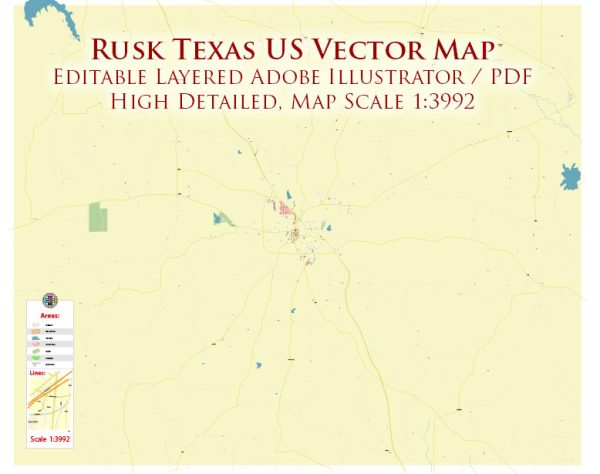Rusk, Texas, has a rich history that reflects the broader patterns of urban development in the United States.
Early Settlement and Founding:
Rusk was founded in 1846 and named after Thomas Jefferson Rusk, a prominent political figure in the Republic of Texas. The town’s establishment was closely tied to the development of the region, which was primarily driven by the expansion of the railroad network and the influx of settlers.
Economic Growth and Railroad Expansion:
As with many towns in Texas during the late 19th and early 20th centuries, Rusk’s economic growth was heavily influenced by the expansion of railroads. Railroads facilitated the transportation of goods and people, connecting Rusk to larger markets and contributing to the town’s prosperity.
Timber Industry:
The East Texas region, including Rusk, played a significant role in the timber industry. The vast pine forests in the area attracted logging and lumber companies, becoming a crucial economic driver for the town. The arrival of the railroads facilitated the transport of timber products, further boosting the local economy.
Institutions and Infrastructure:
Over time, Rusk developed important institutions and infrastructure to support its growing population. Schools, churches, and civic buildings were constructed to meet the needs of the community. The establishment of a prison, the Rusk Penitentiary, added to the town’s significance and provided employment opportunities.
Decline and Revitalization Efforts:
Like many small towns in the latter half of the 20th century, Rusk experienced economic challenges and population decline. Changes in the timber industry and other economic factors contributed to this decline. However, communities often respond to such challenges with revitalization efforts, seeking to preserve their historical character and attract new residents.
Preservation of Historic Sites:
Preserving the town’s history became a focal point for Rusk. Efforts were made to maintain and restore historic buildings and landmarks. Historic districts, museums, and events celebrating the town’s heritage were established to attract visitors and support tourism.
Present-Day Urban Development:
In recent years, Rusk has likely experienced a mix of challenges and opportunities common to many small towns in the United States. Economic diversification, community engagement, and strategic planning may be key elements of present-day urban development efforts. The town may also be exploring ways to balance growth with the preservation of its historical identity.
It’s important to note that specific details about Rusk’s recent urban development would require up-to-date local sources, as community priorities and development strategies can change over time.


 Author: Kirill Shrayber, Ph.D. FRGS
Author: Kirill Shrayber, Ph.D. FRGS